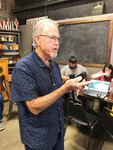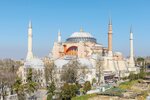




Charles McKamie, the pastor of King Baptist Church and a former history teacher with the Gatesville Independent School District, has a love for travel — especially when he can combine it with other interests.
McKamie spoke about his travels to the nation of Turkey during an April 12 meeting of the Gatesville Lions Club.
"Three things I'm passionate about are the Bible, history and travel," McKamie said. "I'm going back to Turkey in May — it's a fascinating country. Imagine a country that is in both Europe and Asia. It is joined to Bulgaria and Greece in Europe, and on the Asian side to Armenia, Azerbaijan, Iraq, Georgia and Syria. It is also the ancestral home of the Kurds, who are not to be messed with.
"This is a wild, wild place, and they've managed to keep their country relatively safe. On the other side of the Black Sea you have Ukraine, Russia, Romania and Moldova. It's almost miraculous this country has managed to stay intact."
The current land which is Greece has been occupied by different groups over centuries, and was captured by the Ottoman Turks from what had been the Western Roman — or Byzantine — Empire. For hundreds of years, Turkey was part of the Ottoman Empire, until the end of World War I.
"It's basically a new country, it's only existed for about 100 years," McKamie said. "It became a country in October 1923. They had made the mistake of backing Germany (in World War I). The Allies (including Great Britain, France and the United States) were going to give half of the country to Greece and half to Armenia, but the Turks rose up and put a stop to that."
On his first trip to Turkey, McKamie said he arrived in Istanbul, the cultural centerpiece of the country and what for centuries was known as Constantinople.
"It's an interesting place," he said. "The city has been around for at least 2,500 years. It commands the (Bosporus) strait between the Black Sea and the Aegean Sea and controls ship traffic. Russia is very interested in that — Russian tankers have to go through there. That's Russia's only way out to the Mediterranean (Sea) by ship.
"People have profited by running a chain the mile across the water — it's the oldest tollway in history."
As for Istanbul, McKamie said, "it's a city of 5 million or so people with beautiful mosques, many of which used to be churches. The Hagia Sophia (a huge Christian basilica which was then turned into a mosque and a museum) is there. It was built in 325 and the current model is about 1,500 years old. It's a gorgeous thing, and unbelievably huge. When Turkey conquered the city and converted it to a mosque, they did a pretty good job taking care of it."
There are still carvings on a balcony made by Viking bodyguards who were hired to help protect the structure centuries ago.
McKamie said he was challenged by vast differences when he arrived in Turkey.
"I was 5,000 miles from home in a country where I don't speak the language," he said. "The buses there are a great way to get around but I underestimated the size of the bus station. The buses are clean and cheap, and one of the few places in Turkey where nobody smokes. Smoking is the national sport — you can see five guys standing around smoking under a no smoking sign."
After a lengthy bus ride to a city several hours away, to the city of Isparta, McKamie rented a car and set out to see the countryside.
"You will see people getting around with the same transportation their ancestors used 500 years ago," he said. "Those who have cars drive them very fast, so you have to be careful. You'll see people sitting on the side of the road selling cherries during cherry season, and they are as big as golf balls."
McKamie was impressed with the sights and the people of Isparta.
"Isparta has some of the most spectacular things you'll ever see, and many are not on a map or in a guidebook," he said. "Agriculture is done the same way it was done in biblical times. Hay is cut by hand, and you can almost see Ruth and Boaz (from the book of Ruth in the Bible) if you look. It's like stepping back in time — a very long time."
The people are very friendly and welcoming to visitors, Mckamie said. "The men sit out on the street playing games and will offer you whatever they're eating, and they wish they could talk to you (in the same language).
"The stores they have are like they were in America 100 years ago — small craftsmen, blacksmiths, harness makers — and they make their tools. There's no Walmart. It's a step back in time, and I thoroughly enjoyed it."
McKamie said he saw some incredible ancient ruins in Sagalassos, and that "you can also see the effect of earthquakes on every site. There's an ancient fountain and it's absolutely remarkable. I saw a Belgian archaeologist who told me about the site. An arch was erected there over 2,000 years ago when Alexander the Great came in. The people submitted to him and put the arch up in honor of his visit to the city."
McKamie said water still flows through the ancient aqueducts "just like thousands of years ago. The country is honeycombed with springs and the water is as clean, as cold and as pure as it can possibly be. You can get a drink and fill up your water bottle."
He saw Colossae (where the Colossians that the Apostle Paul wrote to lived centuries ago), but that it has not yet been excavated.
McKamie said he would see "herds of goats, sheep or cattle and there is a shepherd who stays with them all day long."
The Silk Road merchants traveled centuries ago went through Turkey, and McKamey said there are still buildings where caravans could find shelter overnight along the old pathway.
McKamie also visited the ancient city of Aphrodisias, which has been dedicated to the Greek god Aphrodite.
"There are some amazing archeological sites and there basically aren't any people around," he said. The heat keeps the tourists away.
"These are some of the best-preserved historical sites in the world at Aphrodisias," McKamie said. "You can see where the Romans converted (the open theater area) into a place where they had gladiatorial contests."
McKamie said in all of his travels, Turkey is a place that stands out to him.
"I have been to many places, and this is the most entertaining, startling and sometimes shocking - there is something around every corner. The sites are amazing and so are the people. The Abrahamic hospitality is still there."